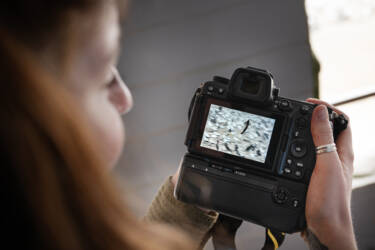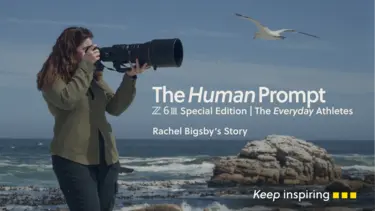How does the Nikon Z6III perform at capturing birds in flight?

Sharp autofocus tracking, a high shutter speed and patience are key to photographing birds on the wing, says Rachel Bigsby as she puts the Nikon Z6III through its paces
Next up to test the new Nikon Z6III – and swapping Antarctica for Cape Town – is Nikon Creator Rachel Bigsby. Tasked with the prompt ‘/Capture: everyday athletes, unexpected performances’, the Bird Photographer of the Year and National Geographic photographer headed to Bird Island in Lambert’s Bay on the Cape’s West Coast and was, happily, met with thousands of Cape gannets.
“Embarrassingly, there’s an hour’s-worth of footage of me crying my heart out over the birds,” Rachel laughs. Equipped with the NIKKOR Z 70-200mm f/2.8 VR S, NIKKOR Z 135mm f/1.8 S Plena and NIKKOR Z 400mm f/2.8 TC VR, the Nikon Creator reports back her findings experimenting with the new 24.4MP camera.

©Jarno Schurgers
Selecting her subject
Location secured; all eyes are now on the subject – so, why the gannet? “There’s no better athlete than a gannet,” Rachel tells Nikon magazine. “They dive 60 miles an hour, swim to 50 metres, fly 100 miles a day and I thought, ‘There’s my everyday athlete, hiding in plain sight.’ I knew the ecology and behaviour of my subject already, so then it was about applying the prompt immediately and figuring out what I could and couldn’t do. I wanted to apply the prompt to the personalities of the subjects I was working with.”
Slower shutter speed to exaggerate movement
Gannets spotted, Rachel’s next task was to capture their movement. “I opted for a slow shutter speed (relative to the high speed of a gannet in flight) to exaggerate their flight and movement across the colony, simultaneously capturing and conveying a sense of the hustle and bustle of the birds behind,” Rachel explains. “This technique requires a level of trial and error, demanding a ‘sweet spot’ balance between shutter speed and aperture to capture the motion without losing detail in the bird’s features.”
Top tip: In the photograph below, Rachel used an aperture of f/14, shutter speed of 1/1000 sec and ISO 100, but remember that camera settings will differ based on your situation.

Z6III + NIKKOR Z 70-200mm f/2.8 S, 175mm, 1/100 sec, f/14, ISO 100, ©Rachel Bigsby
High shutter speed to isolate details
“My approach to capturing this image was to get down to eye level with the birds to identify a courting pair within the several thousand-strong colony,” Rachel continues. “By using a longer lens – this time the NIKKOR Z 400mm f/2.8 TC VR – I was able to isolate a pair and shoot through the colony to utilise the out-of-focus breeding plumage of neighbouring birds to create not only a beautiful and complementary background, but to eliminate distractions of other birds. I patiently waited for the birds to draw up their beaks and ‘bill tap’, with a fast enough shutter speed of 1/2500 sec to capture the movement sharply.”


Testing the new EVF
The Nikon Creator was immediately drawn to the 5760k dot EVF, currently the brightest of any mirrorless camera. “I’m always working in bright light or snow and always wearing sunglasses, so the viewfinder can appear dark, especially when I’m switching between high -key and low-key exposure,” she says. “The brightness of the Z6III’s viewfinder meant that I didn’t need a lot of time for my eyes to adjust.”
Superior tracking
With autofocus taken to the max (for exact stats, click here), plus Pre-Release Capture, the Z6III will keep up with whatever you’re creating. “I’m excited to see a more accessible wildlife camera than the Z9 that doesn’t compromise on technology and quality,” Rachel explains. “The tracking kept up with the flying birds against the distractions of the cliffs and other birds. As a wildlife photographer, having a camera that can keep up with the speed of the wildlife is crucial. I’m super happy with the results.”
Smooth handheld video
In this age, the demand for video has never been higher – a fact Rachel agrees with. “I’m always having to film extra videos for my social media or YouTube or my projects,” she explains. “The quality of the Z6III’s playback was excellent. I was filming the penguins and the gannets in Full HD slow motion, completely handheld. There’s no visible shake or wobble despite filming without a tripod because the camera is so lightweight and easy to hold. It means the transition between handheld photography and handheld filmmaking is so much more practical than it is on a heavy film camera.”
If I could recommend this camera to anyone…
“It’s the perfect first mirrorless camera for real budding photographers and for those who want a fantastic camera that doesn’t break the bank – or your back – while also not compromising on quality,” Rachel concludes. “It’s lightweight, not complicated and doesn’t require lots of homework. You pick it up and it feels familiar in the hand.”
Watch The Human Prompt: The Creative Athlete with Rachel Bigsby below.

Episode 3 | Nikon Z6III with Rachel Bigsby
In this episode, we follow seabird expert and wildlife photographer Rachel Bigbsy as she uses the new Nikon Z6III for the first time. Get an insight into Rachel's workflow, as she demonstrates the advanced capabilities of the Z6III for capturing birds in flight, using the fast FPS settings, bird AF, the super bright EVF - and how all of these features help her to capture dynamic action shots. Keep watching to see how Rachel interprets our prompt - /Capture: everyday athletes, unexpected performances.
Discover the Nikon Z6III
Featured products
More in nature and wildlife
How to elevate your bird photography – Rachel Bigsby’s guide

Unlock greater creativity












